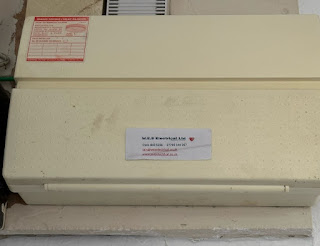🏡 Landlord Certificates and EICR Certificates in Paisley and Surrounding Areas: What You Need to Know in 2025
Whether you're a landlord in Paisley, Renfrew, Johnstone, or the surrounding areas, staying compliant with Scottish housing regulations is critical. One of the most important parts of that compliance? Holding valid and up-to-date landlord safety certificates—particularly the EICR (Electrical Installation Condition Report).
In this guide, we’ll break down the key certificates every landlord needs, why the EICR is non-negotiable, and where you can find trusted, certified electricians like Wes Electrical and the experts at Certificates 4 Landlords to help you stay on the right side of the law.
📋 What Are Landlord Safety Certificates?
Landlord safety certificates are legally required documents that confirm a rental property meets safety standards in areas such as:
Electrical safety (EICR)
Gas safety
Energy performance (EPC)
Legionella risk assessment
PAT Testing (for portable appliances)
In Scotland, the Repairing Standard means landlords must ensure that installations in the property for the supply of electricity are safe and in proper working order. The main way to prove this? A valid EICR certificate.
⚡ What Is an EICR Certificate in Paisley
An Electrical Installation Condition Report (EICR) is a detailed inspection and testing report carried out by a qualified electrician. It checks whether your property’s wiring, sockets, lighting, and fuse board are:
Safe to use
Free from damage or deterioration
Compliant with current electrical regulations
An EICR must be completed at least every five years for rental properties, or more often if recommended by the inspector.
🛑 What Happens if You Don’t Have an EICR?
Not having an up-to-date EICR certificate in Paisley, Renfrew, or nearby areas can result in:
Fines and enforcement notices from the local council
Potential invalidation of landlord insurance
Being banned from letting the property
Legal liability if someone is injured due to an electrical fault
Basically, it’s not worth the risk.
🔌 EICR Testing in Paisley: What’s Involved?
When you book an EICR inspection, a qualified electrician like those at Wes Electrical or Certificates 4 Landlords will:
Inspect the consumer unit (fuse board), sockets, switches, and wiring
Test the functionality of all circuits and safety devices
Identify any issues that pose a danger (e.g., overloads, overheating, faulty wiring)
Issue a report with a “satisfactory” or “unsatisfactory” outcome
If issues are found (C1 or C2 faults), they’ll need to be repaired before you can legally let the property.
🧑🔧 Why Choose Wes Electrical or Certificates 4 Landlords?
If you're searching for EICR electricians near Paisley, you want reliable, experienced, and fully qualified professionals. That’s exactly what you get with:
✅ Wes Electrical
Based in Renfrew and serving Paisley & surrounding areas
Fast, friendly, and fully insured service
Known for emergency call-outs and high-standard repairs
Call them directly at 0141 840 5236
✅ Certificates 4 Landlords
A one-stop shop for all landlord safety certificates
EICR, EPC, Legionella, and more – all under one roof
Excellent reviews and trusted by landlords across the west of Scotland
Affordable pricing and convenient online booking
🌍 Areas Covered
If you’re based in any of the following, you’re covered:
💼 What Other Certificates Do Landlords Need?
Aside from the EICR, landlords in Paisley and the surrounding areas must also have:
EPC (Energy Performance Certificate) – Valid for 10 years and required before a property can be advertised to rent
Legionella Risk Assessment – To ensure the water system is safe
PAT Testing – Especially if the property is furnished
Gas Safety Certificate – For any gas appliances
Using a company like Certificates 4 Landlords simplifies the process—get everything done at once with minimal hassle.
💡 Final Thoughts: Don’t Risk It—Get Certified
The private rental sector is under more scrutiny than ever. With local authorities actively enforcing electrical safety rules, landlords can’t afford to let certificates lapse. Getting a qualified EICR electrician in Paisley isn’t just a formality—it’s about keeping your property, your tenants, and your finances safe.
For fast, affordable, and reliable certification, Wes Electrical and Certificates 4 Landlords are your go-to local providers. They know the regulations inside-out and will make sure you're fully covered.
📞 Ready to Book?
Need a quote or want to schedule a visit?
📞 Wes Electrical: 0141 840 5236
🌐 Certificates 4 Landlords: Visit their site to book online
Make the smart move today—protect your property and ensure you're fully compliant.


